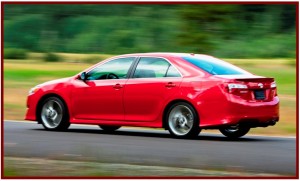
About 15 million Camrys have been sold in more than 100 countries since it debuted in the U.S. in 1983.
Toyota announced today plans to export U.S.-built Camry sedans to its distributor in South Korea. Camry exports to South Korea are forecast at about 6,000 units annually.
The Camry mid-size sedans will be made at Toyota’s manufacturing plant in Georgetown, Kentucky, which is Toyota’s largest manufacturing facility outside of Japan. The strong Japanese Yen is causing Toyota to increase production out of its home country. Whether a U.S. made Camry is any more suited for the Korean market given Japan’s troubled relations with Korea is debatable.
Toyota said last month it would export U.S.-built Sienna minivans to distributors in South Korea. The Sienna is produced at Toyota’s non-union manufacturing plant in Princeton, Indiana. Initial sales projections are small, 600 units annually. Sienna exports will ultimately be helped by the implementation of the controversial Korean FTA or free trade agreement, which the Obama Administration pushed through Congress last in October.
The Korea FTA is opposed by all organized labor groups, except the United Auto Workers Union, which in the view of critics sold out organized labor for the promise that 75,000 UAW-built vehicles would be exported to Korea. Thus far, Ford and General Motors, all with new four-year UAW contracts, have not announced plans to export to Korea, although it is expected they ultimately will. In a statement at the time the FTA passed Congress, Ford said it would help the sale of American-made Focuses, Tauruses, Mustangs, Escapes, and Explorers, among other cars and trucks.
Chrysler Group currently exports a small number of Chrysler, Jeep and Dodge vehicles to South Korea – now ~2,600 annually – and did so before the FTA. Chrysler anticipates expanding the exports under what it says is a more equitable trade agreement, but has not announced any actions.
Korea is the fifth largest producer and fourth largest exporter of motor vehicles in the world, and up to now its car market has been closed to outsiders, even as U.S. taxpayers prop up its economy with massive amounts of defense spending more than 50 years after the Korean War or what was called a “police action” ended.
The U.S. Korean FTA – it’s said – will help redress this imbalance. The revised Korean Free Trade Agreement eliminates tariffs on more than 95% of industrial and consumer goods within five years, according to the White House. But it also protects the Korean beef and pharmaceutical industries.
See:
- Toyota to Export U.S.-Built Sienna to South Korea. FTA that UAW Supported, Also Helps Non-Union Plant Exports
- President Obama and South Korean President Lee Defend Korean FTA at a Michigan General Motors Small Car Plant
- Obama Administration Submits Controversial FTAs to Congress. Largest Loss of Jobs since NAFTA Coming?
- EU-South Korea Free Trade Agreement Favors Koreans
- Toyota Camry Hybrid Prices Cut $850 to $1,150 for 2012
- Ford of Europe CEO Stephen O’Dell Calls for a Comprehensive Industrial Policy and Rejection of Korean FTA
- Korean Automakers Post Huge U.S. Sales Gains as Disputed Free Trade Agreement Heads for Congressional Approval
- General Motors to Build New Chevrolet Malibu in Korea
- UAW Defends Korean FTA as Other Unions Protest Deal
- AFL-CIO Rejects Korean FTA. New Trade Policy Called For
- Korean Free Trade Agreement gets UAW, Ford Support
- Hyundai Strike! UAW to Demonstrate at Hyundai America

